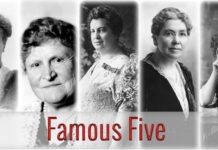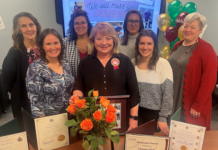North Grenville resident, Michaela Rutherford-Blouin, took part in an extraordinary event which took place on Parliament Hill on International Women’s Day. 338 young women, each one representing their home riding, took the seats in the House of Commons normally occupied by their Member of Parliament. Michaela was chosen to represent our riding of Leeds Grenville, Thousand Islands & Rideau Lakes, as one of these Daughters of the Vote. The Daughters of the Vote, organised by Equal Voice, a national group aiming to “elect more women to all levels of government and change the face of Canadian politics”, were taking part in a four-day political leadership summit. The morning session in the House was the culmination of more than a year of planning by Equal Voice [EV]. Nancy Peckford, North Grenville resident and Executive Director of EV, says that they had been working with the Speaker’s Office for over a year, and the Speaker’s Office became a key partner in the initiative.
The session was kicked off by the Rt. Hon. Kim Campbell, who was on the floor of the House for the event. She spoke to the women about her experiences as Canada’s first, and only, female Prime Minister. Thirty of the delegates were invited to make a statement in the House, and the various party leaders came to address them. Prime Minister Trudeau also allowed questions from the floor. Members of Parliament reversed roles for the morning, filling the Visitor’s Gallery to listen to the delegates’ statements. They stood and applauded, impressed by the quality and commitment of the young women.
Nancy explained how the delegates were chosen: “We worked very hard and were very strategic about how we chose delegates, because we did want it to look and feel like Canada, in all of its diversity. We wanted to present a vision of the country over the next hundred years.”
The Daughters of the Vote was also designed to highlight the slow progress that has been made in bringing women into the political process in Canada. It marked the centenary of the first steps in that direction.
In 1916, some women in three Canadian provinces (Alberta, Manitoba and Saskatchewan) won the right to vote in provincial elections. In 1917, that same right was extended to a limited number of women in federal elections. Following these partial victories, it would take another 45 years for the majority of women living in Canada (over the age of 18), including indigenous women living on federal reserves, to win the right to vote.
In 2015, 26% of Members of Parliament elected to the House of Commons were women. On average, women comprise 28% of elected officials in provincial and territorial legislatures. Only 18% of Canada’s mayors are women.
Michaela was very impressed by her experiences, and an interview with her can be found in this issue of the Times. An interview with Nancy Peckford, talking about Daughters of the Vote and the work of Equal Voice, is available on our website at ngtimes.ca.









